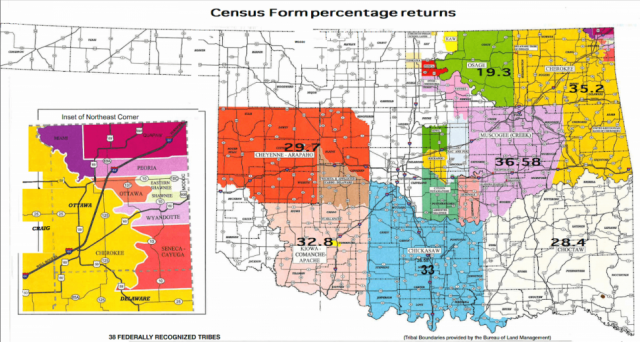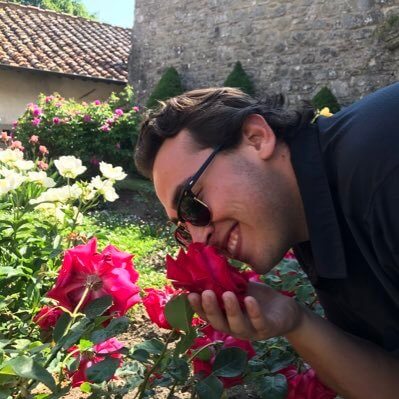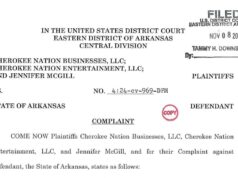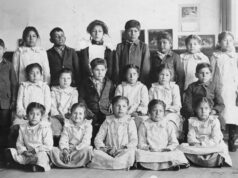
Tribes in Oklahoma have worked the last decade to ensure their members are better counted in the 2020 U.S. census, but the coronavirus pandemic is making that harder.
Some counties where tribes are predominant have lagged far behind others in the statewide count, which last week showed 41 percent of the state’s households having completed the census survey after the second week of the decennial count.
This story was reported by Gaylord News, a Washington reporting project of the Gaylord College of Journalism and Mass Communication at the University of Oklahoma.
Counties that comprise the Choctaw, Cherokee and Muscogee (Creek) Nations were below the state average last week with 28.4 percent, 35.2 percent and 36.5 percent of households being reported, respectively.
Osage County, home of the Osage Nation, is far behind with only 19.3 percent of households having completed the census with nearly the entire response, 19.2 percent, being turned in online. In contrast, the response from Pottawatomie County, home of the Citizen Potawatomi Nation, is higher than the average state response at 45 percent.
“Our tribal nations are important and everyone needs to be counted,” U.S. Rep Kendra Horn (D-OK5) said. “But we know, historically, that Native Americans and indigenous people are undercounted and they are one of the groups that is most likely to be undercounted.”
Horn and U.S. Rep. Tom Cole (R-OK4) introduced a resolution in February that emphasized the importance of tribal participation in the census and the negative impact an undercount will have for tribal communities.
“When we’re talking about tribal communities, the federal programs and the funding that goes to our tribes are dramatically impacted. It goes to help tribal health programs, housing programs, workforce programs, infrastructure, and so much more,” Horn said.
During the 2010 census, Native American communities across the country were undercounted by nearly five percent, or nearly 340,000. Oklahoma tribes were no exception as differences in how tribal affiliation was recorded left many tribal citizens uncounted.
“Ours was an 80 percent undercount when you look at our numbers we had at the time,” said Melissa Landers, senior director of membership services and head of the Complete Count Committee for the Choctaw Nation. “But what hurt our tribe in particular, was being one of three federally recognized tribes to go by Choctaw.”
The tribe learned after the 2010 census unless respondents wrote in “Choctaw Nation of Oklahoma” their tribal affiliation was not counted. This meant the roughly 159,000 that responded with “Choctaw” or “Choctaw Nation” were excluded.
The 24,000 respondents that identified as “Choctaw Nation of Oklahoma,” were then used to determine federal funding and grant money.
“That’s one of the reasons that I’ve emphasized this so much is that it is very important when people fill out the census for tribal citizens to fill out the exact name of their tribe on the census form,” Horn said. “That’s something that we worked with the census on, but right now the solution is we need to make sure that when people fill out their census, they put the official name of their tribe.”
Count me in
In response to the undercount and miscommunication in 2010, the Choctaw Nation took steps leading up to the 2020 census by advertising and using social media. The tribe also started the Complete Count Committee to promote the census and coordinated with the U.S. Census Bureau.
Choctaw Chief Gary Batton in a letter to Steve Dillingham, director of the U.S. Census Bureau, explained the tribe’s situation and asked if completing the form with “Choctaw Nation” would be sufficient in 2020. The bureau agreed.
“The biggest part of our messaging to members was not only do we encourage you to complete the census, but when you do, please be sure to write in you and your family as members of the Choctaw Nation,” Landers said.
The Muscogee (Creek) Nation was also undercounted in 2010 due to variations in how tribal affiliation was recorded.
“We had similar issues and that’s kind of why we put an emphasis on how we are marked,” said Jason Salsman, a spokesman for the Muscogee (Creek) Nation. “So we’re asking our citizens to either put Creek Nation, Muscogee Nation or Muscogee Creek Nation without the parenthesis.”
The tribe is currently working to promote the census through its “Census Day Count Me Muscogee” initiative with online advertising, social media and public service announcements. Due to the coronavirus all in-person efforts have been halted.
“So, for us, it’s been a little bit of unfortunate timing, with the national crisis and the global crisis that we’re facing, because it’s taking a little bit of, I guess you could say energy away from our census push,” Salsman said.
Like all the tribes in the state, the Choctaw Nation’s efforts to raise awareness about the census also have taken a hit.
The Choctaw Nation had to cancel and postpone events that were lined up to promote the census as well, such as youth engagement events and a “roadshow” that would have made its way around the Nation’s travel plazas and casinos.
“So the downside is, while we saw a lot of excitement generated about the census early on, after it actually officially kicked off we’ve not been able to be in personal contact with our members. And so there’s a little bit of concern there,” Landers said.























